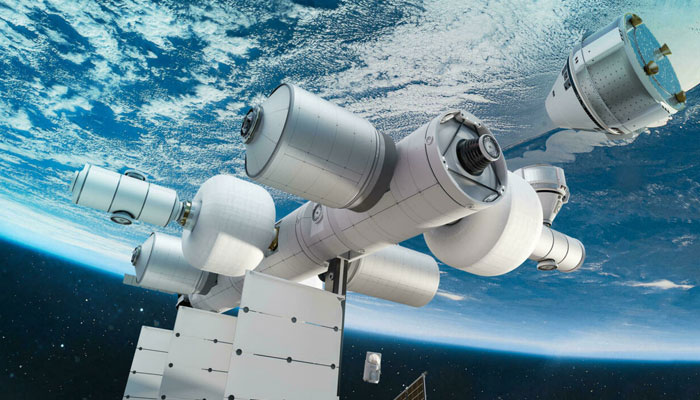Pakistan needs cooperation to increase space capabilities
Islamabad: Maj Gen (r) Amer Nadeem, former chairperson, Pakistan Space & Upper Atmosphere Research Commission (SUPARCO), has advocated strategic partnerships to leverage expertise and resources from other nations enabling Pakistan to advance its space capabilities more efficiently.
Gen Nadeem was delivering keynote address at a seminar on “Pakistan’s space policy: tapping into the space potential” hosted here by Institute of Strategic Studies (ISS). The seminar was attended by academics, area experts, scientists, think-tank representatives, practitioners and members of the diplomatic corps.
Gen Nadeem highlighted the importance of international collaboration and its role in reducing costs and time in space missions. He outlined the National Space Programme (NSP) 2047, underscoring its pragmatic approach tailored to Pakistan’s current technological landscape. He stressed the necessity for strict prioritisation of technologies that align with the country’s immediate needs and capabilities. He expressed optimism about Pakistan’s space programme, citing the government’s steadfast commitment and determination as key drivers of progress. He cited the regulatory sector and the public-private partnerships in this respect. He suggested that joining regional platforms will also help Pakistan develop its space programme. He hoped that with continued support and ownership, Pakistan is poised to achieve significant milestones in space exploration.
Dr Adil Sultan, Dean, Air University, his remarks said that it is necessary for Pakistan to realign its space policy advocating a strategic shift from geopolitics to astropolitics. He said that clarity and a well-defined roadmap to advance the nation’s space objectives is critical. He opined it is urgent for Pakistan to prioritise commercial space technology reducing dependency on foreign assistance for satellite launches and fostering indigenous capabilities. He called for establishing robust think-tanks and academic institutions dedicated to space technology.
Dr Ali Sarosh from Air University referring to the crucial role of space technology in fostering sustainable development and outlined key considerations for the NSP to contribute to this objective effectively he said global consensus exists on the significance of space technology for sustainable development. He underscored the commitments made by the international community in this regard. He stressed the need for the NSP to align with the SDGs outlined in Agenda 2030
Earlier, in his welcome remarks, Sohail Mahmood, DG, ISS observed that Pakistan’s first-ever space policy provided a comprehensive framework for the future development of the space sector in line with emerging global trends and catering to Pakistan’s crucial national needs. He foresaw NSP as a catalyst for advancing technology-driven solutions to developmental challenges. Khalid Mahmood, chairperson, BoG, ISS, Malik Qasim Mustafa and Ghazala Yasmin Jalil also spoke on the occasion.
-
 Prevent Cancer With These Simple Lifestyle Changes
Prevent Cancer With These Simple Lifestyle Changes -
 Experts Reveal Keto Diet As Key To Treating Depression
Experts Reveal Keto Diet As Key To Treating Depression -
 Inter Miami Vs Barcelona SC Recap As Messi Shines With Goal And Assist
Inter Miami Vs Barcelona SC Recap As Messi Shines With Goal And Assist -
 David Beckham Pays Tribute To Estranged Son Brooklyn Amid Ongoing Family Rift
David Beckham Pays Tribute To Estranged Son Brooklyn Amid Ongoing Family Rift -
 Jailton Almeida Speaks Out After UFC Controversy And Short Notice Fight Booking
Jailton Almeida Speaks Out After UFC Controversy And Short Notice Fight Booking -
 Extreme Cold Warning Issued As Blizzard Hits Southern Ontario Including Toronto
Extreme Cold Warning Issued As Blizzard Hits Southern Ontario Including Toronto -
 Lana Del Rey Announces New Single Co-written With Husband Jeremy Dufrene
Lana Del Rey Announces New Single Co-written With Husband Jeremy Dufrene -
 Ukraine-Russia Talks Heat Up As Zelenskyy Warns Of US Pressure Before Elections
Ukraine-Russia Talks Heat Up As Zelenskyy Warns Of US Pressure Before Elections -
 Lil Nas X Spotted Buying Used Refrigerator After Backlash Over Nude Public Meltdown
Lil Nas X Spotted Buying Used Refrigerator After Backlash Over Nude Public Meltdown -
 Caleb McLaughlin Shares His Resume For This Major Role
Caleb McLaughlin Shares His Resume For This Major Role -
 King Charles Carries With ‘dignity’ As Andrew Lets Down
King Charles Carries With ‘dignity’ As Andrew Lets Down -
 Brooklyn Beckham Covers Up More Tattoos Linked To His Family Amid Rift
Brooklyn Beckham Covers Up More Tattoos Linked To His Family Amid Rift -
 Shamed Andrew Agreed To ‘go Quietly’ If King Protects Daughters
Shamed Andrew Agreed To ‘go Quietly’ If King Protects Daughters -
 Candace Cameron Bure Says She’s Supporting Lori Loughlin After Separation From Mossimo Giannulli
Candace Cameron Bure Says She’s Supporting Lori Loughlin After Separation From Mossimo Giannulli -
 Princess Beatrice, Eugenie Are ‘not Innocent’ In Epstein Drama
Princess Beatrice, Eugenie Are ‘not Innocent’ In Epstein Drama -
 Reese Witherspoon Goes 'boss' Mode On 'Legally Blonde' Prequel
Reese Witherspoon Goes 'boss' Mode On 'Legally Blonde' Prequel




